Ethics and Law for Creative Industries: Dove Case Study Analysis
VerifiedAdded on 2020/10/22
|6
|1329
|146
Report
AI Summary
This report presents an ethical case study of Dove, a personal care brand owned by Unilever. It examines the ethical and legal issues arising from Dove's advertising campaigns, particularly those involving racial discrimination. The report applies ethical theories such as utilitarianism, virtue theory, Kantianism, and the right theory of ethics to analyze Dove's actions. It argues that Dove's campaigns were unethical, violating principles of fairness, respect, and equality, and causing harm to various stakeholders. The report concludes that unethical practices can damage a company's reputation and image. The analysis is supported by references to academic sources.
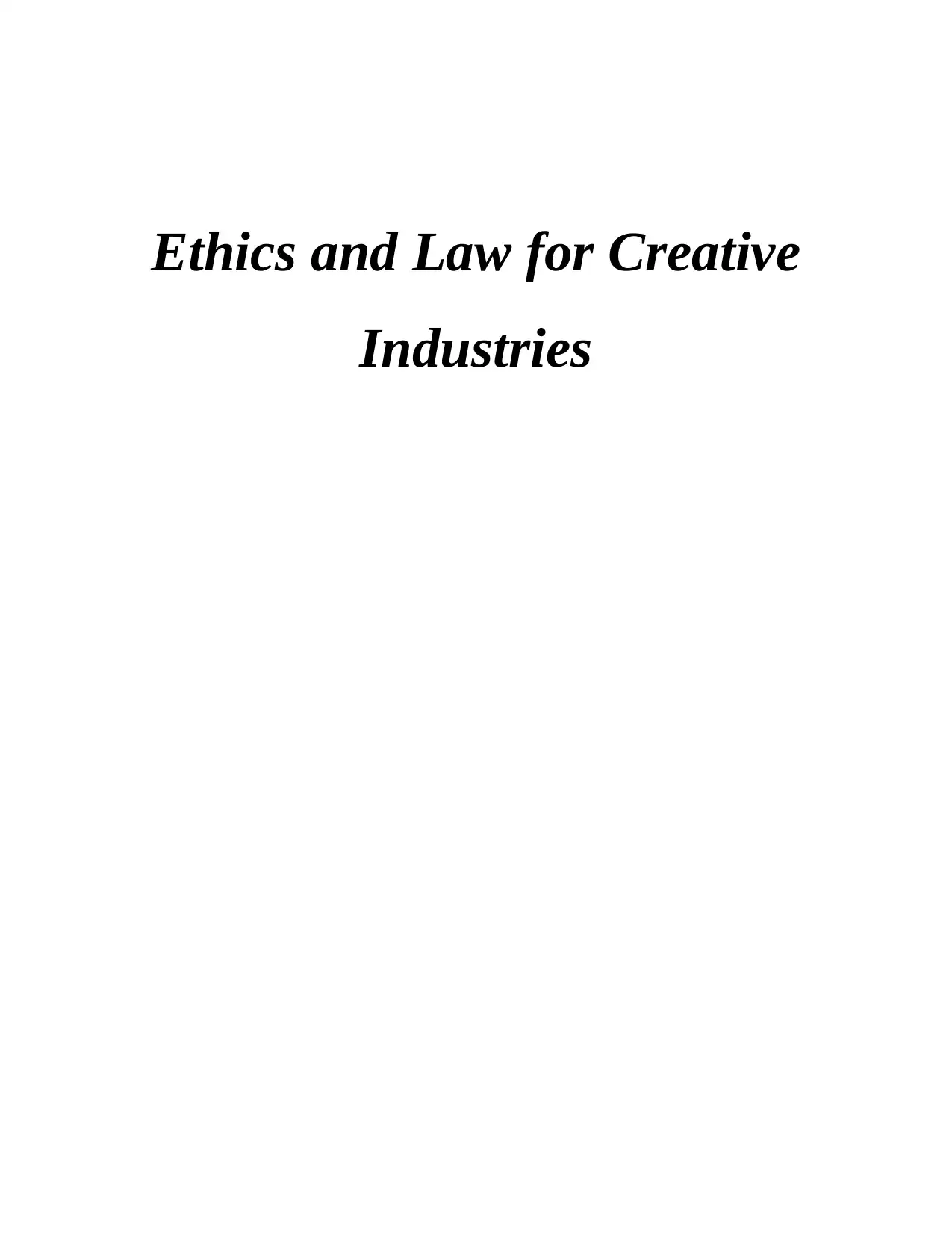
Ethics and Law for Creative
Industries
Industries
Paraphrase This Document
Need a fresh take? Get an instant paraphrase of this document with our AI Paraphraser
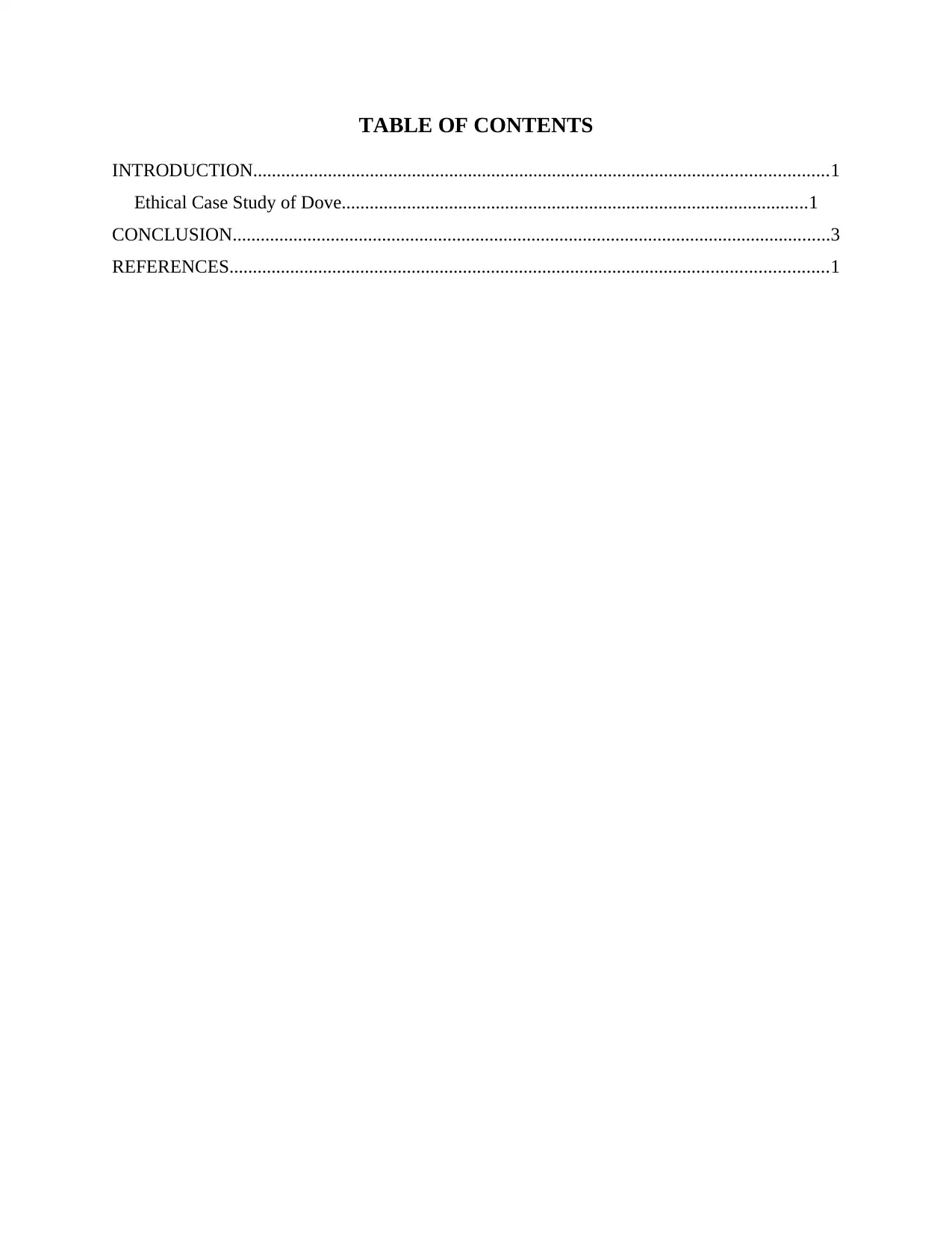
TABLE OF CONTENTS
INTRODUCTION...........................................................................................................................1
Ethical Case Study of Dove....................................................................................................1
CONCLUSION................................................................................................................................3
REFERENCES................................................................................................................................1
INTRODUCTION...........................................................................................................................1
Ethical Case Study of Dove....................................................................................................1
CONCLUSION................................................................................................................................3
REFERENCES................................................................................................................................1
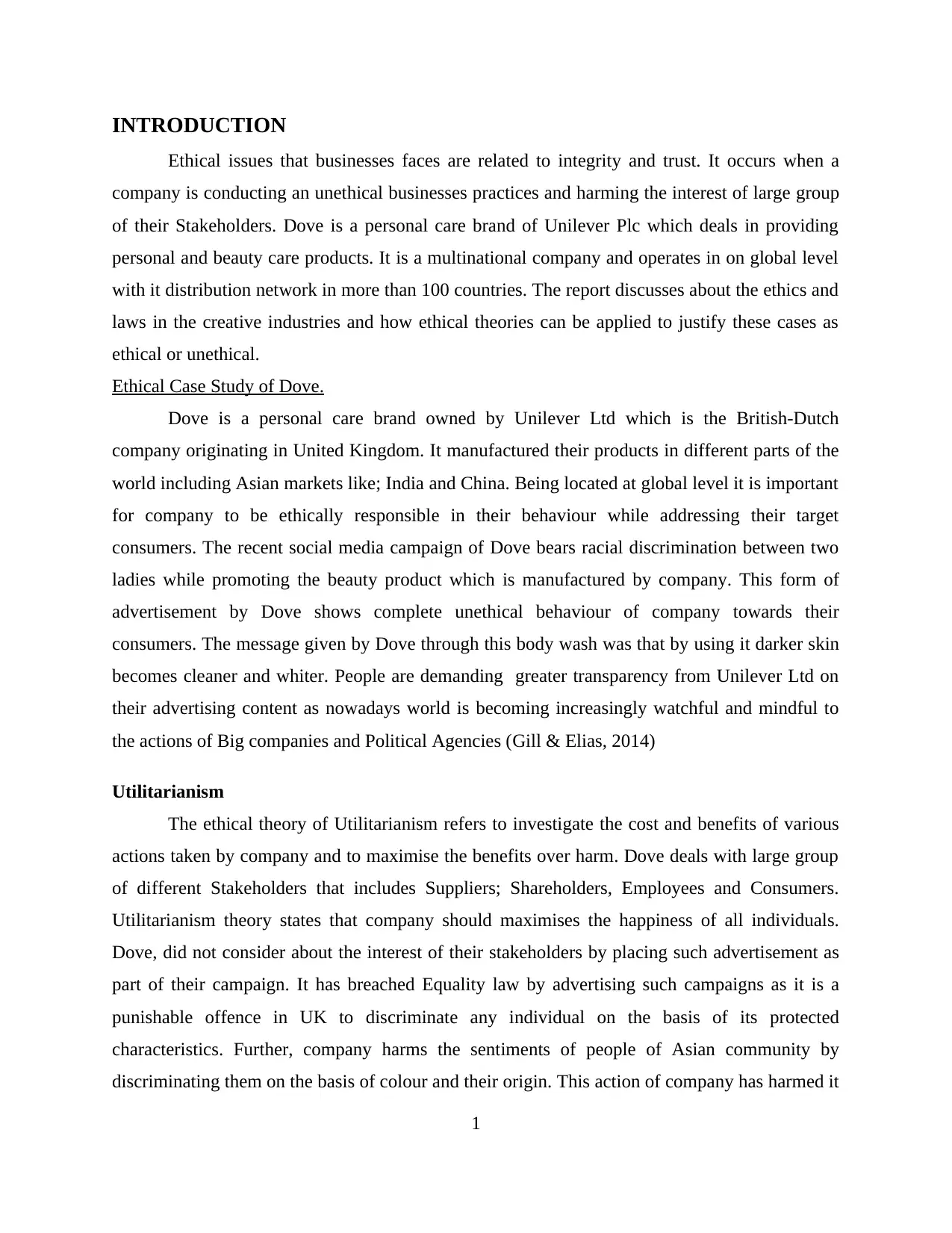
INTRODUCTION
Ethical issues that businesses faces are related to integrity and trust. It occurs when a
company is conducting an unethical businesses practices and harming the interest of large group
of their Stakeholders. Dove is a personal care brand of Unilever Plc which deals in providing
personal and beauty care products. It is a multinational company and operates in on global level
with it distribution network in more than 100 countries. The report discusses about the ethics and
laws in the creative industries and how ethical theories can be applied to justify these cases as
ethical or unethical.
Ethical Case Study of Dove.
Dove is a personal care brand owned by Unilever Ltd which is the British-Dutch
company originating in United Kingdom. It manufactured their products in different parts of the
world including Asian markets like; India and China. Being located at global level it is important
for company to be ethically responsible in their behaviour while addressing their target
consumers. The recent social media campaign of Dove bears racial discrimination between two
ladies while promoting the beauty product which is manufactured by company. This form of
advertisement by Dove shows complete unethical behaviour of company towards their
consumers. The message given by Dove through this body wash was that by using it darker skin
becomes cleaner and whiter. People are demanding greater transparency from Unilever Ltd on
their advertising content as nowadays world is becoming increasingly watchful and mindful to
the actions of Big companies and Political Agencies (Gill & Elias, 2014)
Utilitarianism
The ethical theory of Utilitarianism refers to investigate the cost and benefits of various
actions taken by company and to maximise the benefits over harm. Dove deals with large group
of different Stakeholders that includes Suppliers; Shareholders, Employees and Consumers.
Utilitarianism theory states that company should maximises the happiness of all individuals.
Dove, did not consider about the interest of their stakeholders by placing such advertisement as
part of their campaign. It has breached Equality law by advertising such campaigns as it is a
punishable offence in UK to discriminate any individual on the basis of its protected
characteristics. Further, company harms the sentiments of people of Asian community by
discriminating them on the basis of colour and their origin. This action of company has harmed it
1
Ethical issues that businesses faces are related to integrity and trust. It occurs when a
company is conducting an unethical businesses practices and harming the interest of large group
of their Stakeholders. Dove is a personal care brand of Unilever Plc which deals in providing
personal and beauty care products. It is a multinational company and operates in on global level
with it distribution network in more than 100 countries. The report discusses about the ethics and
laws in the creative industries and how ethical theories can be applied to justify these cases as
ethical or unethical.
Ethical Case Study of Dove.
Dove is a personal care brand owned by Unilever Ltd which is the British-Dutch
company originating in United Kingdom. It manufactured their products in different parts of the
world including Asian markets like; India and China. Being located at global level it is important
for company to be ethically responsible in their behaviour while addressing their target
consumers. The recent social media campaign of Dove bears racial discrimination between two
ladies while promoting the beauty product which is manufactured by company. This form of
advertisement by Dove shows complete unethical behaviour of company towards their
consumers. The message given by Dove through this body wash was that by using it darker skin
becomes cleaner and whiter. People are demanding greater transparency from Unilever Ltd on
their advertising content as nowadays world is becoming increasingly watchful and mindful to
the actions of Big companies and Political Agencies (Gill & Elias, 2014)
Utilitarianism
The ethical theory of Utilitarianism refers to investigate the cost and benefits of various
actions taken by company and to maximise the benefits over harm. Dove deals with large group
of different Stakeholders that includes Suppliers; Shareholders, Employees and Consumers.
Utilitarianism theory states that company should maximises the happiness of all individuals.
Dove, did not consider about the interest of their stakeholders by placing such advertisement as
part of their campaign. It has breached Equality law by advertising such campaigns as it is a
punishable offence in UK to discriminate any individual on the basis of its protected
characteristics. Further, company harms the sentiments of people of Asian community by
discriminating them on the basis of colour and their origin. This action of company has harmed it
1
⊘ This is a preview!⊘
Do you want full access?
Subscribe today to unlock all pages.

Trusted by 1+ million students worldwide
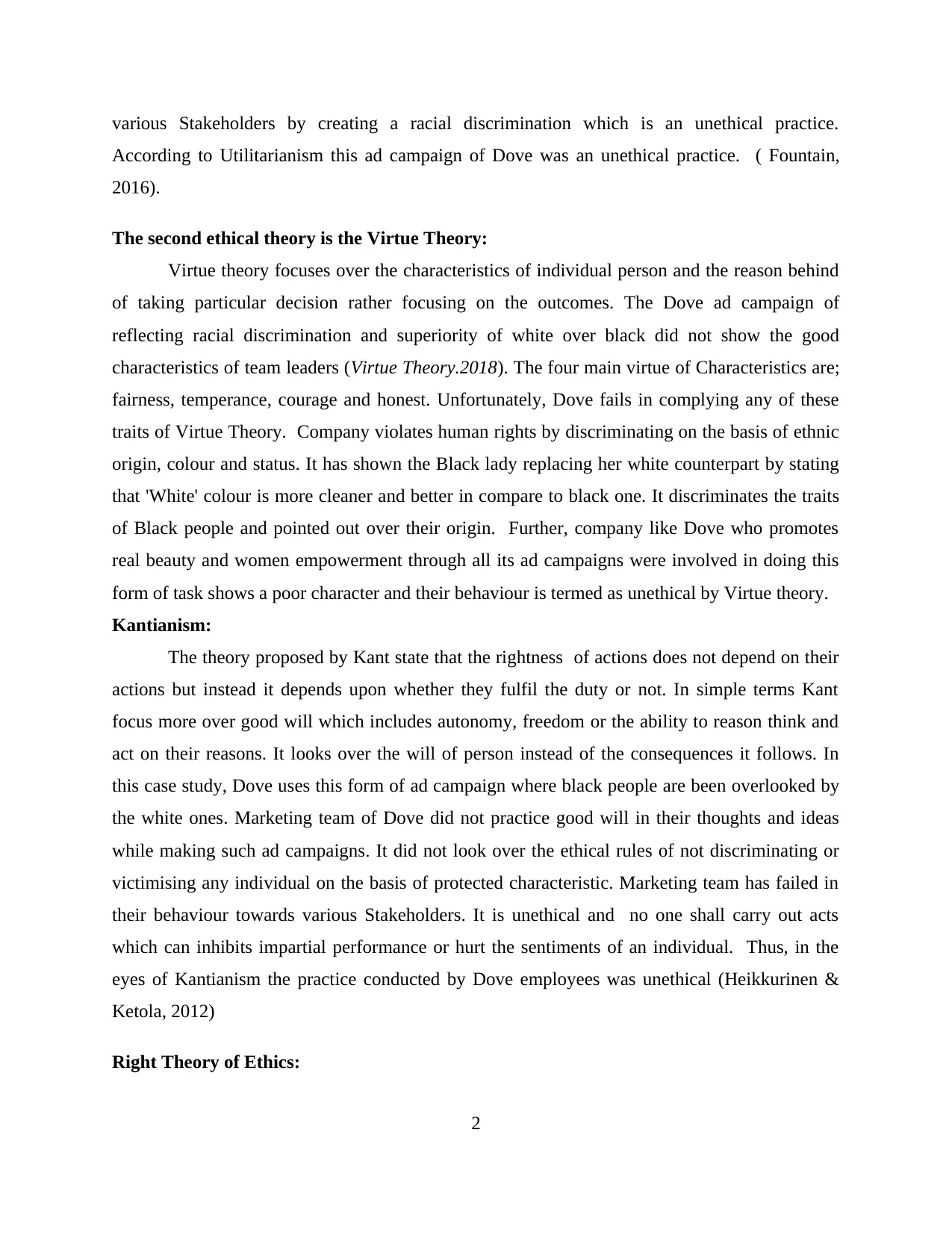
various Stakeholders by creating a racial discrimination which is an unethical practice.
According to Utilitarianism this ad campaign of Dove was an unethical practice. ( Fountain,
2016).
The second ethical theory is the Virtue Theory:
Virtue theory focuses over the characteristics of individual person and the reason behind
of taking particular decision rather focusing on the outcomes. The Dove ad campaign of
reflecting racial discrimination and superiority of white over black did not show the good
characteristics of team leaders (Virtue Theory.2018). The four main virtue of Characteristics are;
fairness, temperance, courage and honest. Unfortunately, Dove fails in complying any of these
traits of Virtue Theory. Company violates human rights by discriminating on the basis of ethnic
origin, colour and status. It has shown the Black lady replacing her white counterpart by stating
that 'White' colour is more cleaner and better in compare to black one. It discriminates the traits
of Black people and pointed out over their origin. Further, company like Dove who promotes
real beauty and women empowerment through all its ad campaigns were involved in doing this
form of task shows a poor character and their behaviour is termed as unethical by Virtue theory.
Kantianism:
The theory proposed by Kant state that the rightness of actions does not depend on their
actions but instead it depends upon whether they fulfil the duty or not. In simple terms Kant
focus more over good will which includes autonomy, freedom or the ability to reason think and
act on their reasons. It looks over the will of person instead of the consequences it follows. In
this case study, Dove uses this form of ad campaign where black people are been overlooked by
the white ones. Marketing team of Dove did not practice good will in their thoughts and ideas
while making such ad campaigns. It did not look over the ethical rules of not discriminating or
victimising any individual on the basis of protected characteristic. Marketing team has failed in
their behaviour towards various Stakeholders. It is unethical and no one shall carry out acts
which can inhibits impartial performance or hurt the sentiments of an individual. Thus, in the
eyes of Kantianism the practice conducted by Dove employees was unethical (Heikkurinen &
Ketola, 2012)
Right Theory of Ethics:
2
According to Utilitarianism this ad campaign of Dove was an unethical practice. ( Fountain,
2016).
The second ethical theory is the Virtue Theory:
Virtue theory focuses over the characteristics of individual person and the reason behind
of taking particular decision rather focusing on the outcomes. The Dove ad campaign of
reflecting racial discrimination and superiority of white over black did not show the good
characteristics of team leaders (Virtue Theory.2018). The four main virtue of Characteristics are;
fairness, temperance, courage and honest. Unfortunately, Dove fails in complying any of these
traits of Virtue Theory. Company violates human rights by discriminating on the basis of ethnic
origin, colour and status. It has shown the Black lady replacing her white counterpart by stating
that 'White' colour is more cleaner and better in compare to black one. It discriminates the traits
of Black people and pointed out over their origin. Further, company like Dove who promotes
real beauty and women empowerment through all its ad campaigns were involved in doing this
form of task shows a poor character and their behaviour is termed as unethical by Virtue theory.
Kantianism:
The theory proposed by Kant state that the rightness of actions does not depend on their
actions but instead it depends upon whether they fulfil the duty or not. In simple terms Kant
focus more over good will which includes autonomy, freedom or the ability to reason think and
act on their reasons. It looks over the will of person instead of the consequences it follows. In
this case study, Dove uses this form of ad campaign where black people are been overlooked by
the white ones. Marketing team of Dove did not practice good will in their thoughts and ideas
while making such ad campaigns. It did not look over the ethical rules of not discriminating or
victimising any individual on the basis of protected characteristic. Marketing team has failed in
their behaviour towards various Stakeholders. It is unethical and no one shall carry out acts
which can inhibits impartial performance or hurt the sentiments of an individual. Thus, in the
eyes of Kantianism the practice conducted by Dove employees was unethical (Heikkurinen &
Ketola, 2012)
Right Theory of Ethics:
2
Paraphrase This Document
Need a fresh take? Get an instant paraphrase of this document with our AI Paraphraser
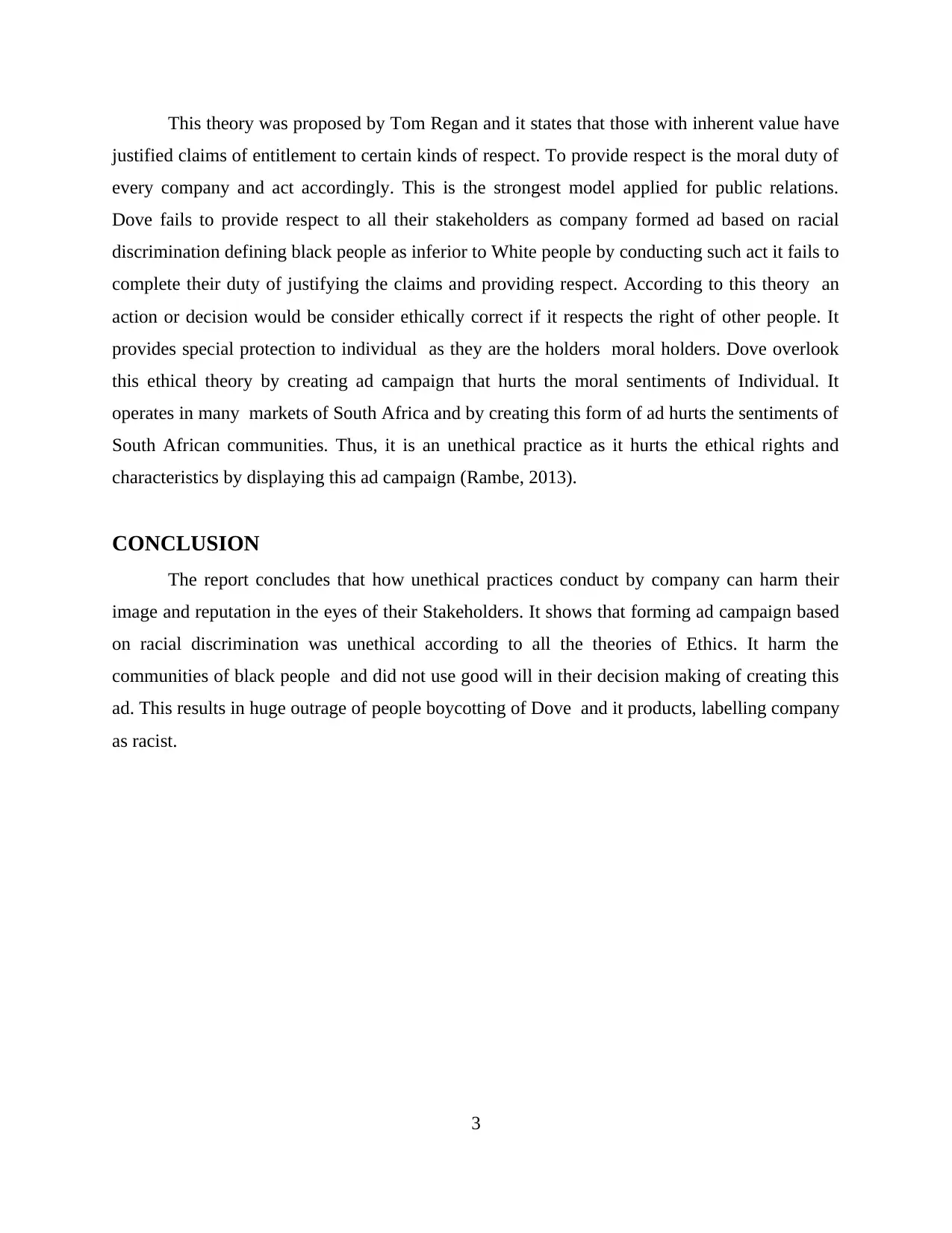
This theory was proposed by Tom Regan and it states that those with inherent value have
justified claims of entitlement to certain kinds of respect. To provide respect is the moral duty of
every company and act accordingly. This is the strongest model applied for public relations.
Dove fails to provide respect to all their stakeholders as company formed ad based on racial
discrimination defining black people as inferior to White people by conducting such act it fails to
complete their duty of justifying the claims and providing respect. According to this theory an
action or decision would be consider ethically correct if it respects the right of other people. It
provides special protection to individual as they are the holders moral holders. Dove overlook
this ethical theory by creating ad campaign that hurts the moral sentiments of Individual. It
operates in many markets of South Africa and by creating this form of ad hurts the sentiments of
South African communities. Thus, it is an unethical practice as it hurts the ethical rights and
characteristics by displaying this ad campaign (Rambe, 2013).
CONCLUSION
The report concludes that how unethical practices conduct by company can harm their
image and reputation in the eyes of their Stakeholders. It shows that forming ad campaign based
on racial discrimination was unethical according to all the theories of Ethics. It harm the
communities of black people and did not use good will in their decision making of creating this
ad. This results in huge outrage of people boycotting of Dove and it products, labelling company
as racist.
3
justified claims of entitlement to certain kinds of respect. To provide respect is the moral duty of
every company and act accordingly. This is the strongest model applied for public relations.
Dove fails to provide respect to all their stakeholders as company formed ad based on racial
discrimination defining black people as inferior to White people by conducting such act it fails to
complete their duty of justifying the claims and providing respect. According to this theory an
action or decision would be consider ethically correct if it respects the right of other people. It
provides special protection to individual as they are the holders moral holders. Dove overlook
this ethical theory by creating ad campaign that hurts the moral sentiments of Individual. It
operates in many markets of South Africa and by creating this form of ad hurts the sentiments of
South African communities. Thus, it is an unethical practice as it hurts the ethical rights and
characteristics by displaying this ad campaign (Rambe, 2013).
CONCLUSION
The report concludes that how unethical practices conduct by company can harm their
image and reputation in the eyes of their Stakeholders. It shows that forming ad campaign based
on racial discrimination was unethical according to all the theories of Ethics. It harm the
communities of black people and did not use good will in their decision making of creating this
ad. This results in huge outrage of people boycotting of Dove and it products, labelling company
as racist.
3
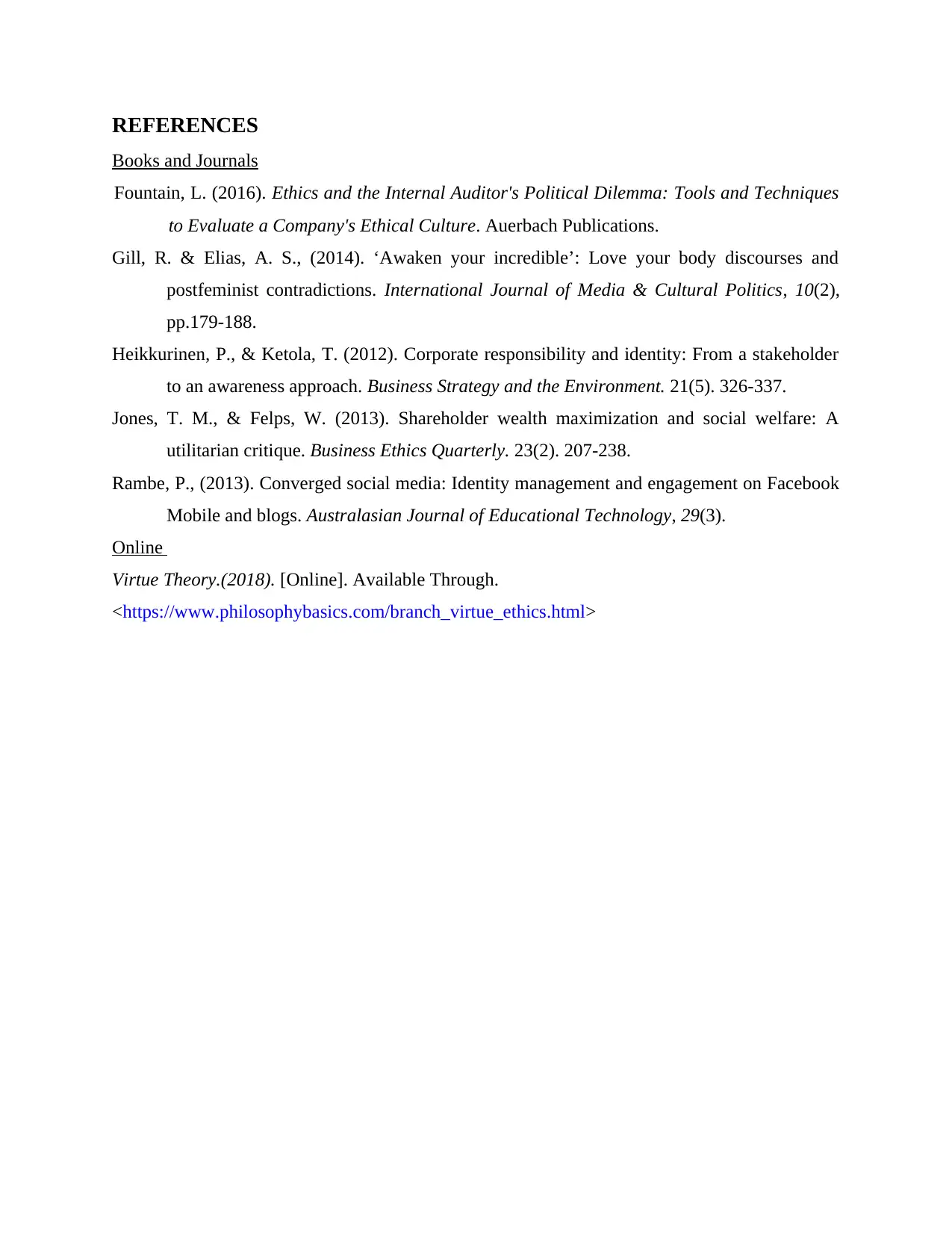
REFERENCES
Books and Journals
Fountain, L. (2016). Ethics and the Internal Auditor's Political Dilemma: Tools and Techniques
to Evaluate a Company's Ethical Culture. Auerbach Publications.
Gill, R. & Elias, A. S., (2014). ‘Awaken your incredible’: Love your body discourses and
postfeminist contradictions. International Journal of Media & Cultural Politics, 10(2),
pp.179-188.
Heikkurinen, P., & Ketola, T. (2012). Corporate responsibility and identity: From a stakeholder
to an awareness approach. Business Strategy and the Environment. 21(5). 326-337.
Jones, T. M., & Felps, W. (2013). Shareholder wealth maximization and social welfare: A
utilitarian critique. Business Ethics Quarterly. 23(2). 207-238.
Rambe, P., (2013). Converged social media: Identity management and engagement on Facebook
Mobile and blogs. Australasian Journal of Educational Technology, 29(3).
Online
Virtue Theory.(2018). [Online]. Available Through.
<https://www.philosophybasics.com/branch_virtue_ethics.html>
Books and Journals
Fountain, L. (2016). Ethics and the Internal Auditor's Political Dilemma: Tools and Techniques
to Evaluate a Company's Ethical Culture. Auerbach Publications.
Gill, R. & Elias, A. S., (2014). ‘Awaken your incredible’: Love your body discourses and
postfeminist contradictions. International Journal of Media & Cultural Politics, 10(2),
pp.179-188.
Heikkurinen, P., & Ketola, T. (2012). Corporate responsibility and identity: From a stakeholder
to an awareness approach. Business Strategy and the Environment. 21(5). 326-337.
Jones, T. M., & Felps, W. (2013). Shareholder wealth maximization and social welfare: A
utilitarian critique. Business Ethics Quarterly. 23(2). 207-238.
Rambe, P., (2013). Converged social media: Identity management and engagement on Facebook
Mobile and blogs. Australasian Journal of Educational Technology, 29(3).
Online
Virtue Theory.(2018). [Online]. Available Through.
<https://www.philosophybasics.com/branch_virtue_ethics.html>
⊘ This is a preview!⊘
Do you want full access?
Subscribe today to unlock all pages.

Trusted by 1+ million students worldwide
1 out of 6
Your All-in-One AI-Powered Toolkit for Academic Success.
+13062052269
info@desklib.com
Available 24*7 on WhatsApp / Email
![[object Object]](/_next/static/media/star-bottom.7253800d.svg)
Unlock your academic potential
Copyright © 2020–2026 A2Z Services. All Rights Reserved. Developed and managed by ZUCOL.


